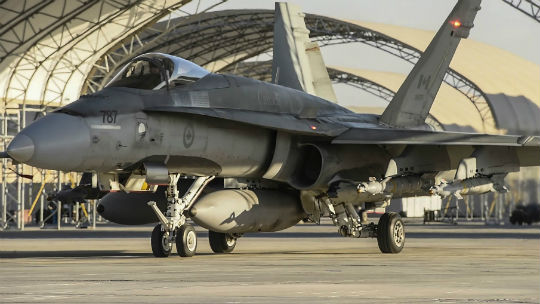Estimated reading time 3 minutes, 59 seconds.

The six Royal Canadian Air Force (RCAF) CF-188 Hornet fighter jets deployed from Kuwait to bomb Islamic State militants in Iraq and Syria since November 2014 will be withdrawn by Feb. 22. Aircraft and personnel will return to Canada in phases, said government officials on Feb. 8.
The announcement was made by Defence Minister Harjit Sajjan during a joint news conference with Prime Minister Justin Trudeau, Foreign Affairs Minister Stephane Dion and International Development Minister Marie-Claude Bibeau.
“Within two weeks from today, the CF-18 crews will cease operations in theatre,” Sajjan revealed at the end of an opening statement, having first said that RCAF crews would continue to fly a CC-150 Polaris tanker and a CP-140 Aurora intelligence, surveillance and reconnaissance (ISR) platform.
Trudeau had promised during last fall’s general election campaign that he would withdraw the Hornets from Operation Impact, Canada’s contribution to the multi-national Middle East Stabilization Force. He thanked the fighter pilots and their Kuwait-based ground crews for their role to date, saying, “It is important to understand that while air strike operations can be very useful to achieve short-term military and territorial gains, they do not on their own achieve long-term stability for local communities.”
He said the Canadian Armed Forces’ role going forward will involve “allocating more military resources to training Iraqi security forces,” as well as “empowering local forces to take their fight directly to ISIL.”
In addition to maintaining its air-to-air refuelling and ISR roles, and the expanded training of ground troops, Canada will also work with its international partners to deliver $840 million in humanitarian assistance over the next three years, and an additional $270 million for refugee housing in neighbouring Middle East countries.
Sajjan said that the greatest need now is for “expanded training and intelligence capability,” which he said will involve tripling the number of Canadian trainers now on the ground in northern Iraq to approximately 200. That would be accompanied by a “significant” increase in resources dedicated to intelligence gathering in the region “to help the coalition and Iraqi security forces develop a more sophisticated picture of the threat and improve our ability to target, degrade and defeat ISIL.”
Trudeau was asked to explain why RCAF assets would be used to refuel other coalition partners’ aircraft, which would then continue the bombing mission.
He replied that while “there’s no question . . . there is a role for bombing,” Canada’s combat experience in Afghanistan, where Sajjan served three tours, had shown that “we can actually offer the best help in a different way. . . . That is what we have articulated today: a complete and robust mission that engages all different aspects of where Canada is good, and where we can best help to offer stability and security.”
Trudeau said that Canada’s involvement would continue for at least two years, at which point he said there would be a vote in Parliament on whether to extend it further.
He also said that U.S. President Barack Obama “fully understands our . . . campaign commitment and our right to make the choices that suit Canada and Canada’s mission,” and that the President “is thankful that we are stepping up our training and our other areas of involvement.”








